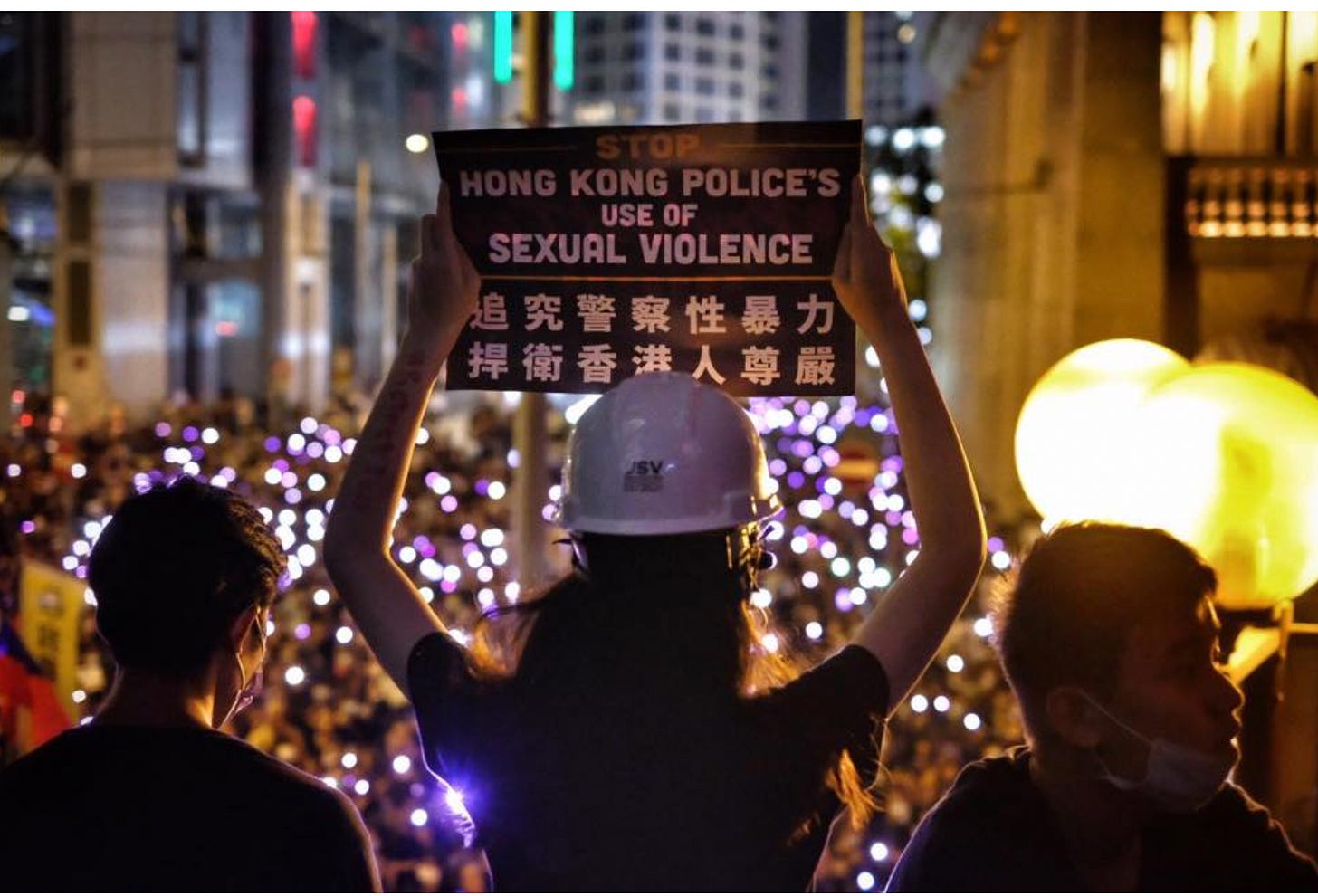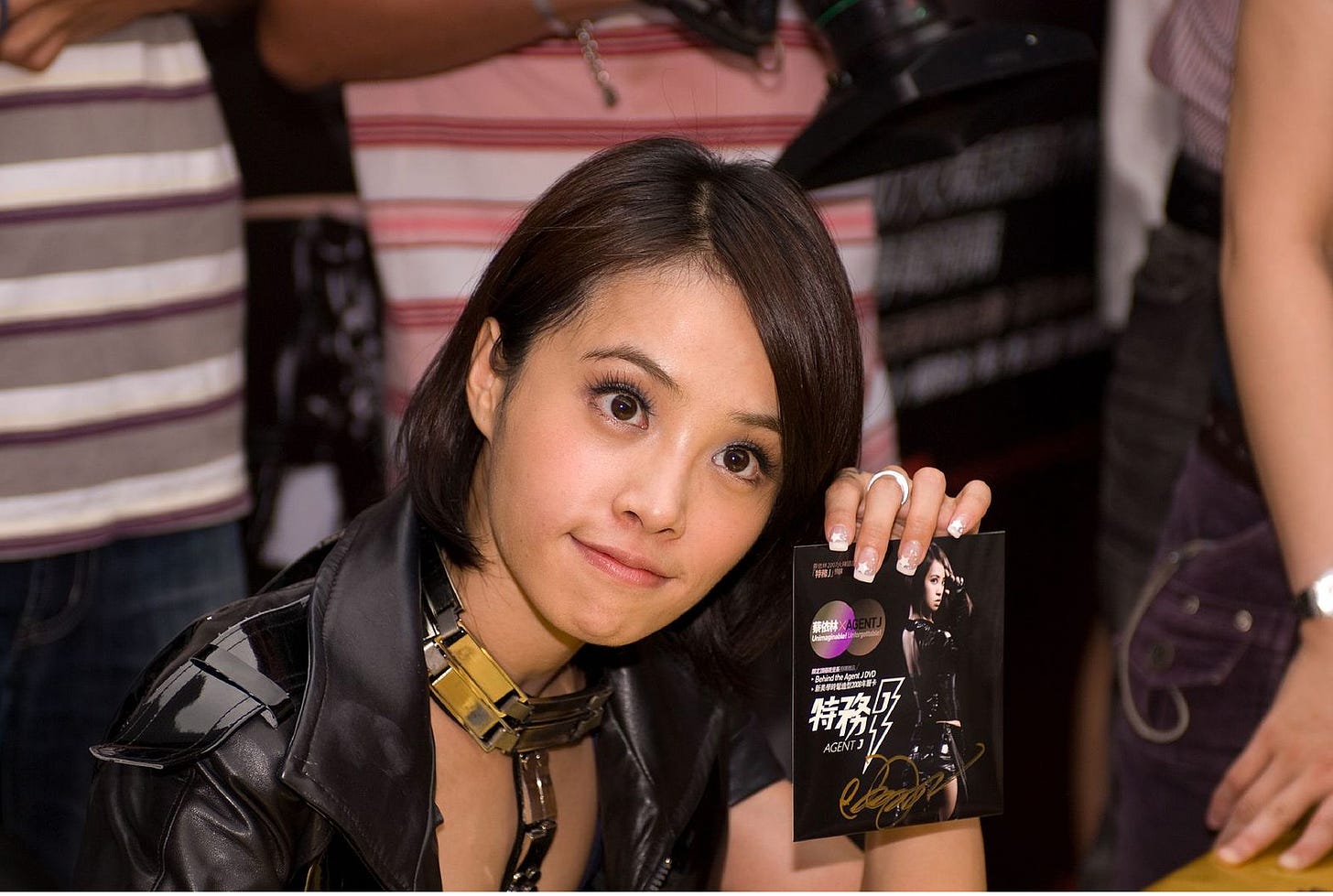The Trilogy Trap
Failure to ramp up and back up his mutinous, wolf-warrior 'shout and shock' global therapy may turn out to be Xi Jinping's least constructive legacy. It may also be a Trilogy Trap
Prescient artwork on China’s plans for Taiwan, back in times when we could comfortably imagine, Does true sanity lie in madness? Robert Fuqua / Ziff-Davis Publishing; WikiCommons.
How threatening is China? We’ve been through the “be scared, be very scared” stage, but we’re now entering the “maybe China’s not as big and scary as we thought” stage.
The latter is a nod – a raise of the eyebrows – in the direction of, “Do we even like these guys?”
The “Do we even like these guys?” stage generally leads to war.
Call it the “Trilogy Trap” – a futuristic intergalactic-empire metaphor not unlike that described by Thucydides narrating the conflict between Sparta and Athens in 400 BC (except involving planets revolving around different stars in a galaxy faraway – in keeping with the Amazing Stories theme; see picture above).
Book Three has to be war, right?
All this as the South China Morning Post reports that China has resumed live military drills today around Taiwan as President Tsai Ing-wen received the country’s first US congressional delegation since Nancy Pelosi’s controversial visit.
Wu Qian, a spokesman for China’s Ministry of Defense, said that the drills were a …
… a resolute counterstrike and solemn deterrence to the consecutive provocations by the US and Taiwan that undermine peace and stability across the Taiwan Strait,” said Wu Qian, a spokesman for China’s Ministry of Defence, according to a readout by the ministry.
Anyway.
Terrestrially, everything under China’s sun – from its military might, global reach and its domestic economy – is flashing red alerts in Western media.
Let’s get this straight. As we wrote in the last ChinaDiction, we believe that a conflict over Taiwan involving Taiwan itself, the US and Japan will likely amount to mutually assured destruction (MAD).
But, at the same time, the wind of public opinion – and it’s gusting at climate-change speeds – hints our opponent may not be as formidable as we previously thought, which means we could walk away from this with just one prosthetic leg that doesn’t connect with our non-existent iPhones.
Nationalist Interest notes that Adm. Mike Gilday, the chief of Naval Operations, relayed in a media conference call that the US and Japan were still the champs of the Pacific – especially underwater.
He added in roundabout, perhaps diplomatic terms.
[I’d like] “to be in a position in the mid-to-late 2020s where we’re deploying a large unmanned with a—with a carrier strike group. And of course, the future idea with large unmanned is that that be a—that that be a missile carrier.
Admiral Gilday was clear that while China is the pacing threat and may outnumber the United States in terms of the total number of surface ship hulls, the U.S. Navy remains unparalleled in terms of near-future capabilities as well as underwater capabilities.
OK, segueing from the military side of things to what Americans call pocketbook issues, there’s the economy.
The housing sector is looking wobbly, Chinese SOEs are delisting from the New York Stock Exchange (see entry below) because the auditing rules are too complicated and Huawei’s profits are contracting amid US restrictions, reports the Wall Street Journal (paywall).
But even none of that is important. Chinese are not paying their mortgages,
China can’t meet its semiconductor goals, its local governments are mostly struggling to pay off debts because Beijing makes it their responsibility not to make Beijing look bad.
But, and this is important: it’s not as if we aren’t all limping too. We may simply be at the limits of all-inclusive global growth (which never happened) and be unable to “get past it” without a fierce scrabble over the leftovers.
China will not win that fight globally.
But we don’t have a vision for what happens next: an artisanal, gender-accepting future populated by woodworkers, horticulturalists and sour-dough and craft-beer hobbyists gone pro?
Who needs high-speed rail?
They’re delisting!
Chaos on the floor of the New York Stock Exchange in 1963, long before China’s biggest SEOs began delisting. Photo: O'Halloran/Library of Congress.
The Wall Street Journal reports that five huge Chinese SOEs – China Life Insurance, PetroChina, China Petroleum & Chemical, Aluminum Corp., and Sinopec — have announced they intend to delist from the New York Stock Exchange.
Reason: they can’t fulfill US audit requirements.
China and the U.S. have had disagreements over differing standards of audit records for years. The two parties have held talks to try to reach a deal and avoid mass delisting of Chinese companies or stock trading bans. There were more than 200 Chinese companies listed in the U.S. with a market value of around $2 trillion in 2021.
Bloomberg (porous paywall) adds that the voluntary delistings were expected for specific reasons; not simply as part of an accelerating decoupling of the US and PRC:
As US and Chinese officials try to reach a deal, speculation has been mounting that a solution could involve companies that Beijing deems sensitive voluntarily exiting US markets.
“These state-owned enterprises are in strategic sectors and deemed to have access to information and data that the Chinese government may be hesitant to give access to foreign regulators,” said Redmond Wong, a strategist at Saxo Markets.
So where are the semiconductors?
The reality of SMIC’s real semiconductor achievements are opaque, if not shrouded in darkness. Photo: WikiCommons.
Opinion over at Bloomberg points out again (it’s been much in the news) that both Washington and Beijing are smarting due to failed semiconductor goals.
Architects of China’s ambitious efforts may be facing the music for having not produced world-beating technology, Bloomberg News reported this week. Multiple corruption probes announced by authorities stem from anger among the nation’s top leaders over an inability to develop semiconductors that could replace American components, it reported. Two of the most scrutinized areas are the $9 billion bailout of Tsinghua Unigroup Co., and the National Integrated Circuit Industry Investment Fund — known as the Big Fund.
We all need to be alert to hype and boosterism everywhere, but it’s particularly a problem when it comes to China and anything called “Big Fund”.
Back to Bloomberg:
Those looking at China’s achievements are mostly finding what they seek, and ignoring the rest. Semiconductor Manufacturing International Co., for example, got a lot of attention recently when industry analysts TechInsights wrote: ‘SMIC has been able to fabricate features that are small enough to be considered 7nm.’ That “nm” figure refers to nanometers, a metric for the size of connections within a chip (smaller is better), and these days is as much a marketing term as a scientific one.
The real proof is in the mass-produced pudding.
China chip cheerleaders see this as an incredible breakthrough, bringing the Shanghai-based firm closer to the capabilities of world leaders Taiwan Semiconductor Manufacturing Co. and Samsung Electronics Co. But it’s not, really. What SMIC appears to have done is produce a somewhat standard chip, used for bitcoin mining, and with little evidence it can churn these out with good yields or at scale.
Any budding chef trying to make soufflé will eventually pull off a couple of good samples. But mastery can only be claimed when almost all attempts are successful (yield), and can be done consistently and in large quantities (scale). By contrast, TSMC and Samsung rolled out mass production at 7 nm four years ago — a demonstration that they’d nailed the process.
#MeToo case thrown out of court
OK, nitpickers, it’s Hong Kong, but one country two systems didn’t work and #MeTooPolitics are global. Photo: 梁柏堅(表弟)Pakkin Leung. WikiCommons.
SupChina reports that a court in Beijing has shut down China’s most high-profile #MeToo case.
Beijing No. 1 Intermediate People’s Court said that it “will uphold the previous judgment” over a case that began in 2018, when Zhōu Xiǎoxuán 周晓璇 (also known by the pseudonym Xiánzǐ 弦子) stepped forward to accuse popular state television host Zhū Jūn 朱军 of forcibly kissing and groping her while she interned for the network in 2014.
Zhou’s case is #MeToo-movement signature, but it’s by far hardly the only high-profile case in China to put the spotlight on the legal system’s failure to engage with gender equality.
China tennis star Peng Shuai – who accused former Chinese vice premier Zhang Gaolin of sexual assault last year – has reappeared in public, for example, but not with a tennis racquet.
Her public appearances, many fear, may, in other words, be coercively scripted – more a racket than a racquet.
The Greater Sinosphere
Australia
Stephen FitzGerald, Australia’s first ambassador to China and all-round panda-hugger was very upset by the treatment of the Chinese ambassador at the National Press Club.
Chinese Ambassador Xiao Qian’s …
… speech was friendly, conciliatory and constructive, not only highlighting the benefits of the economic relationship, but pressing Beijing’s willingness to reset and stabilise our relations and listing a number of specific issues on which we can have new or enhanced collaboration.
However, in the Q&A, pushed into a corner by aggressive and hostile media, he repeated the official government line on Taiwan, which as ambassador he must, but which most of these journalists breathlessly and sensationally reported as though it had never been said before by any PRC official. So little do they actually know, or seek to inform themselves, about China. From the body language of some, expressing obvious personal antipathy and animosity, one might speculate that they had already composed the headlines and much of their reporting before the event.
Let’s be clear here. China’s ambassador in answer to a question, basically admitted that “reeducation” would be required after unification – unification is a euphemism for invasion – in order for Taiwanese to have a “correct understanding of China.”
China’s been doing it for decades in Tibet and in recent years they’ve doubled down in Xinjiang, former East Turkestan. Reeducation with the aim of broadening correct understandings of China. Coming to a neighborhood near you.
Read FitzGerald’s Comrade Ambassador if you want an inside track on the matey, rhyming-slang naivety that led Australia into a win-win relationship with China that was bound to inevitably be win-win for one party only – although it was great for Ozzie homeowners when the going was good.
Activist promises to kiss the ground on return to Oz
ChinaDiction is not sure he did kiss the ground – there’s probably a A$15,000 fine for doing that on an Australian landing strip – but we know he’s home.
It’s on Twitter:
Taiwan
Gay pride event pushes at bounders, gets canceled
Pride New York, 2019. Photo: DVSROSS, WikiCommons.
How on Earth China gets any say on gay pride events anywhere is beyond us, but Focus Taiwan reports that the Taiwanese organizers of the WorldPride 2025 are backing off from holding the event because InterPride, the event organizers, refuse to accept the use of “Taiwan” in the Kaohsiung event previously scheduled for 2025.
OK, proud Kaohsiung was pushing at InterPride’s political boundaries.
All previous WorldPride events have been named based on their host cities, including WorldPride Copenhagen-Malmo 2021 and Sydney WorldPride 2023, but Kaohsiung was trying to set a new precedent by calling its event WorldPride Taiwan 2025.
KMT to the rescue
Vice KMT head Andrew Hsia. Amid controversy, he went to China to sort everything out anyway. Photo: WikiCommons.
Taipei’s New Bloom reports that the KMT has sparked yet more controversy in Taiwan by announcing that KMT vice chair Andrew Hsia is headed to China to sort out cross-strait misunderstandings.
The issue is particularly sensitive, seeing as this occurs immediately after unprecedented Chinese military live-fire drills surrounding Taiwan.
The visit provoked backlash from younger members of the KMT almost immediately. A petition was launched by younger KMT politicians calling on Hsia not to travel to China. The signatories are primarily KMT city councilors or KMT city councilor candidates from Taipei, New Taipei, Pingtung, and Changhua.
The petition brought up that any trip to China by pan-Blue politicians could easily be misunderstood in the period of heightened tensions. Indeed, the optics of the visit are quite poor for the KMT, with some expecting that backlash over the Chinese live-fire drills could in fact hand the next set of elections to the DPP.
But, wait: there’s more.
According to the Taiwan News, Hsia has resigned as as advisor to the Taichung City Government after going ahead with his trip.
Hsia and the party leadership said the aim of the Aug. 10-27 trip was to exchange views with Taiwanese business people working in China. High-level contacts with Chinese officials were said to be less likely.
It’s still the wrong move for the KMT at such a sensitive moment, and the idea that the KMT can do anything but bend over backwards for the CCP is roundly seen as ridiculous in Taiwan.
Taiwan’s caregivers want a better deal
Photo: CNA
In what’s been a long struggle for higher wages, Focus Taiwan reports that Taiwan’s foreign caregivers are not impressed with the conditions of the Taiwan government’s “wage hike.”
Basically, it won’t immediately apply to tens of thousands of migrants already employed in the country.
The wage increase announced Wednesday, the first since 2015 for family-employed caregivers, will raise the minimum wage for live-in migrant caregivers in Taiwan to NT$20,000, from NT$17,000 previously.
The new minimum wage will still be NT$5,250 lower than for Taiwanese workers because live-in caregivers are not covered by Taiwan's Labor Standards Act, a sticking point among many of the foreign workers affected by the policy.
They were particularly upset, however, that the new hike will only apply to newly arrived migrant workers and those currently in Taiwan about to sign a new contract, but does not affect workers with existing contracts.
Almost all of us deserve a better deal, but Taiwan caregivers … What do you say? A national argument over US$100 (NT$3,000) extra a month.
Editorially speaking, Taiwan will become a much better place when it wakes up to the fact that the people it needs right now – and who will add to the country’s already impressive ethnic diversity – are not just “little brown people.”
Jolin, Jolin, Jol-eeeen!
Taiwan singer Jolin Tsai is taking hit on her Weibo following. Photo: chungkeng ryu; WikiCommons.
Singapore media reports that Taiwanese singer Jolin Tsai has “lost around 270,000 Weibo followers after not sharing a post that declares "There is only one China" days after U.S. House Speaker Nancy Pelosi’s visit to Taiwan.
Minutes before Pelosi arrived in Taiwan last week, CCTV News posted an image on Weibo with the words "There is only one China in the world.” Soon after that, over 100 Chinese, Taiwanese and Hong Kong celebrities commented on the post using the hashtag #ThereIsOnlyOneChina and later shared the post on their Weibo accounts.
It’s hard to say “no” to the money, but Taiwan has a history of artists that decline to sellout to the Mandopop industry.
Coda
Tsai weeps as Wicked Witch of West flees on broomstick
Oh, Chinese social media, can’t you give it a break? Nobody’s sweating about your military theatrics around and over Taiwan.
But you’re winning immense global support for the little island that roared – a country that as recently as the 1980s was mostly regarded with suspicion worldwide as another Asian right-wing autocracy.















